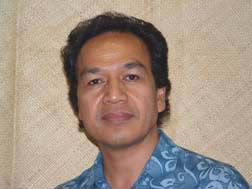|
Interview
with Vilsoni Hereniko
|
 |
What inspired you to make The Land Has Eyes?
My father was a storyteller, so I grew up listening to stories of the island, its so-called myths and legends. Since film is the most powerful medium for storytellers today, I wanted to use it to tell a story, in much the same way my father did, except for the medium that is of course different. I believe a powerful story has the potential to transform other people’s lives, and I think The Land Has Eyes has the potential to make people more aware of our spiritual and enduring relationship with the land and to see the land as a living human being. This is a view of the land held by many native people around the world. In today’s climate, this is an important message for all of us.
What
films, courses or books have most influenced your work?
When I was younger, I was very much influenced by Greek mythology
and stories from the bible. As a young playwright, I was in awe of
the playwrights Ibsen and Shakespeare. In recent years, I’ve
been influenced a great deal by Pacific writers such as Albert Wendt,
Patricia Grace, and Epeli Hau’ofa. Filmmakers whose work I adore
are mainly from Asia – Moshen Mahmalbaf, Buddadeb Dusgupta,
Marilou Diaz-Abaya, Zang Yimou, and many others.
Are
many of the incidents in The Land Has Eyes similar to incidents in
your life?
Yes, The Land Has Eyes has many events or incidences that
are similar to my own experiences growing up on the island. For example,
my father died when I was fourteen, about the age of the protagonist,
and that had a profound impact on me as a young boy. My father too
was falsely accused of a crime he didn’t commit. And like the
protagonist, I too excelled in school because I saw education as the
only way out for me. But I didn’t want the film to be strictly
autobiographical, so I made the protagonist a girl so that I would
have more creative choices and have more freedom as an artist creating
a work of fiction.
What
is it about being Rotuman that influenced the way you wrote and directed
The Land Has Eyes?
As a Rotuman going back to the island of my birth to make a movie,
I had obligations and responsibilities to my own people. For example,
it was important to me not to misrepresent or create stereotypes about
the Rotuman people. I had a responsibility to create characters that
are recognizably Rotuman in the way they react to situations and events.
I wanted the characters to speak in their own language because this
is what they would do in real life. Because the court and the school
on the island employed English as the medium of communication, then
English was used. But I didn’t want to use English simply because
that’s the preferred language of mainstream society. I wanted
to make a film that would speak to the Rotuman experience –
this mattered more to me than anything else. This meant that before
the screenplay was completed, I went around the island telling the
story to several different audiences to get their feedback, I also
had to get permission from all the chiefs on the island to film there,
and I also wanted to use Rotuman actors, except for the warrior woman
who migrated to the island and the district commissioner who was a
representative of the Queen of England.
How
has your experience as a professor of film, literature, theater and
cultural identity prepared you to be a filmmaker?
My academic and intellectual work has made me extremely sensitive
to the power of images and how they can be dangerous to a people or
a culture if they are not handled with compassion. My awareness of
the negative and stereotypical representations of Pacific Islanders
in early films, literature and theater has meant that I’m committed
to creating works of art that treat Pacific Islanders with respect
and dignity. This doesn’t mean that all my characters are wonderful
and perfect human beings; it simply means that the characters are
fully human, and come across as people we recognize as believable,
with great potential to do good as well as evil.
You
are a playwright with more than a dozen plays to your credit. How
do you decide what story is better presented as live theater as compared
to feature films?
Theater depends a lot on dialog. A film depends primarily on its visuals.
The Land Has Eyes is very visual, and I believe film is a
better medium for it. I think it’s possible to follow a lot
of the story by merely watching the visuals because dialog is only
used when necessary. Most of the time one can follow the story by
observing people’s actions, their facial expressions, the context
itself. The Land Has Eyes is an original script, written
specifically for a visual medium.
What
is your next feature film project?
I am writing a romantic comedy with Jeannette called "Welcome
To My Island." It is about a Pacific Islander filmmaker and his
American producer whose efforts to make an indie film on a remote
South Seas island are derailed by a military coup, a modern-day Jesus,
a self-appointed Queen and a drug addict.